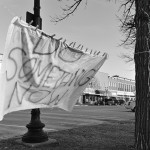Browsing Articles

Crafting the Annual Stewardship Letter
Don’t undervalue the power of the letter that accompanies your annual stewardship campaign materials. It’s the invitation your congregation extends for folks to participate in its exciting ministries, a case statement for why their time, talent and treasure are worthy of investing. This resource explains some of the key elements of a good stewardship letter and provides some wonderful examples. Good luck! (Photo by Beate Meier, used by Creative Commons license)

Faithful Budget, Faithful Stewardship
Your church budget is a moral document, reflecting the priorities of your faith community. Likewise, as Christians we are called to be good stewards of all resources, whether they be individual or communal. This paper was produced by the National Council of Churches Eco-Justice program (now Creation Justice Ministries) and examines two areas of our federal budget where Christians may wish to gain greater understanding in order to more effectively advocate for faithful use of these resources.

Go in Peace—and then do something!
15th Sunday after Pentecost, Year B, Lectionary Reflection
September 6, 2015
Luther may have called the book of James an “epistle of straw,” but this week’s lessons complement each other, compelling us to action after having been “opened” to the amazing grace of Jesus. (Photo: Daniel Holt, Creative Commons)

Let’s Hear it for Dirty Disciples!
14th Sunday after Pentecost, Year B Lectionary Reflection
August 30, 2015
Sometimes disciples have to get their hands dirty to do God’s work, and that may not always be the popular choice. Today’s lessons lift up the importance of seeing beyond a little surface dirt to the work of ministry and the love of neighbor. (Photo: St0rmz, Creative Commons)

A Tough Teaching
Lectionary Reflection for the Thirteenth Sunday after Pentecost, Year B, August 23, 2015
Yes, this is a difficult teaching, but is there really anything else worth learning? We’re at the end of the “Bread of Life” series of lessons in the Year B of the Revised Common Lectionary, complete with Peter’s confession. The key is how to make it our confession today. (Photo: Fotolia)

Hungry Hungry Humans and the Bread of Life
Twelfth Sunday after Pentecost Year B Lectionary Reflection, August 16, 2015
If you’re ever played the game “Hungry Hungry Hippos” you may have a good image for this Sunday’s gospel reading. Curious? Read on! You can even find out how to make a “Hungry Hungry Human Game.” (Photo: Chris, Creative Commons)

Giving ‘Because of God’s Great Mercy’
As I work with congregations in their stewardship ministry, I’m always surprised how few annually ask members and friends of the congregation to increase their giving. Most people won’t increase giving if you don’t ask them to. “Because of God’s Great Mercy” is a complete program that provides everything a congregation needs to make a direct, respectful request, along with a simple way for people to calculate an increase of 1/2 of 1% of household income.” (Photo by Artotem, used by Creative Commons license)

Less Fuss, More Feasting
Lectionary Reflection for the 11th Sunday after Pentecost, Year B, August 9, 2015
It’s oh so easy to focus on the negatives in life and in our congregations. Jesus instructs us to choose another way, to feast on the Bread of Life and follow his lead. (Photo:Just Cook NYC, Creative Commons License)

Little Things Make a Difference
In light of Pope Francis’ encyclical on climate change and the effects of our consumer culture on the planet and particularly on the poor, author Tom Beutel examines small ways we can choose to make a bigger difference. He also provides links to excellent resources. (Photo © Dmitry Rukhlenko – Fotolia.com)

Non-Perishable Discipleship
Tenth Sunday after Pentecost, Year B, August 2, 2015
Hungry people and perishing food do not make for a pleasing combination or happy picture, especially in light of this week’s gospel lesson (John 6:24-35) where we feast on the image of Jesus as the bread of life, as food that does not perish. There’s a stewardship connection here it would seem. (Photo US Department of Agriculture, Creative Commons)


